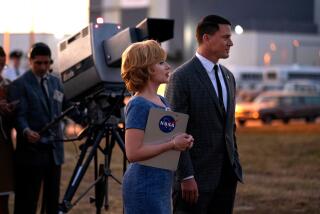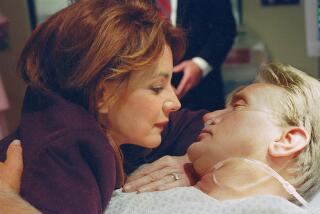Film Doesn’t Do Justice to Swigert the Astronaut or Person
- Share via
If you’ve seen “Apollo 13,” you know it could have been titled “The Heroic Mission of Cmdr. Jim Lovell and the Miraculous Return to Earth of the All-American Family Man.” Not to be entirely cynical, I’m aware the film is based on Lovell’s book “Lost Moon” and accomplishes the edge-of-your-seat re-creation of the emotion and innovation of those seven days in space when NASA came within a sigh of sending three astronauts into eternal orbit.
However, as a “factual” film, producer Brian Grazer disappointingly almost ignores the identity of the two other astronauts who accompanied Lovell--Tom Haise and Jack L. Swigert Jr., played by Bill Paxton and Kevin Bacon, respectively. “Apollo 13” revives a pride in American technology and ingenuity--and we shouldn’t forget there were three crewmen who each contributed greatly to bringing Apollo 13 home.
I was disappointed in the one-dimensional portrayal of rookie astronaut Swigert, whom I met in 1968. Bacon was forced to play Swigert a bit lopsided--first giving us the impression that in his off-hours he was a cocky, skirt-chasing bachelor and later portraying him as an intimidated, insecure and perhaps resented member whose every move was scrutinized for error. As a last embarrassment to the memory of Jack Swigert, who died in 1984 after being elected to Congress in Colorado, Haise utters a nasty and silly crack about somehow having contracted “the clap” from the rookie.
I would like to attempt to set the record straight on Swigert, who was a best friend. For several years from 1968 through 1972, he flew to LAX from Houston to visit me when he had six or eight hours away from training. He would run up my walkway in his NASA jumpsuit and give the neighbors a big thrill.
He was always the epitome of good manners. He was shy, good-humored, optimistic and intense. I learned about his love for flying that captured him at age 14 and never let go. He liked onions and hot sauce. Before April, 1970, he joked about not being married if and when he went to the moon--there would be no earthbound spouse waiting for him or to give interviews. His nickname at the University of Colorado, where he played right guard on the football team, was “Big Swig.” He invited me to accompany him to the White House dinner commemorating the Apollo 11 moon landing; he arranged a tour of the Manned Spacecraft Center in Houston for my parents. He was never embarrassing, aggressive or egotistical. His own apartment was filled with pictures of airplanes and spacecraft--no Vargas prints or piles of Playboy or Penthouse. He was an avid amateur photographer. His one extravagance was a fur-covered lounge chair (for one).
When he was given the Apollo 13 assignment, he had flown for 24 of his 38 years and brought more than 6,000 flight hours to the mission.
*
For the record, he was uniquely qualified to step into the difficult job of maneuvering Apollo 13’s command ship Odyssey. As a member of the Air Force he flew fighter jets in Korea and Japan for three years. He was a jet fighter pilot for both the Massachusetts and Connecticut air national guards and was an engineering test pilot for North American Aviation and Pratt & Whitney before joining NASA in 1966. He was a member of the support crews for both Apollo 7 and 11. He held three college degrees, including a master of science in aerospace science. He was an associate fellow of the Society of Experimental Test Pilots and a member of the American Institute of Aeronautics and Astronautics. Never before had a backup astronaut been thrust into a leading role on such short notice.
Before the flight, he called to say he was ready and that there was little doubt he could handle the extremely difficult task before him. I have a clipping that quotes Donald (Deke) Slayton, the astronaut “boss,” as saying, “It’s like trying to put Glenn Miller into Tommy Dorsey’s band. Both are great musicians, but each has a different style. They wouldn’t play in Carnegie Hall without a rehearsal.” He called me from the Iwo Jima to say he was OK, but had “seen the face of God.”
I called Ron Howard’s Imagine Entertainment offices to offer background material on Jack. I was initially told that my insight would be welcome because the writers were having difficulty gathering material on him. However, no one ever called me. I would like to think I could have changed subtly the image that millions will have of Jack L. Swigert Jr. But Hollywood usually stereotypes its bachelors, and Jack, 25 years after the fact, fell prey to that chintzy ploy.
We kept in touch until two weeks before his death. He would have loved the film. He would have hated his character.
More to Read
Only good movies
Get the Indie Focus newsletter, Mark Olsen's weekly guide to the world of cinema.
You may occasionally receive promotional content from the Los Angeles Times.










